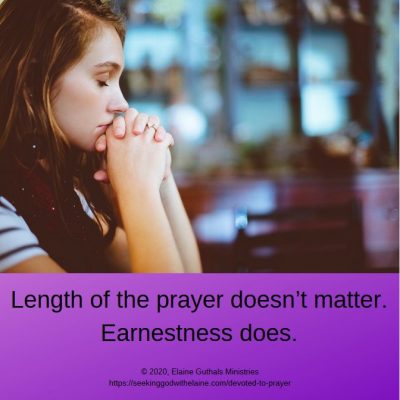If we want to increase the discipline in our prayer lives, where do we start? One place we can start is evaluating how devoted we are to our prayer life. This devotion, the second in the series, looks at our attitude toward prayer.
Nuggets
- We discipline ourselves by devoting ourselves to prayer.
- God isn’t focusing on the minutes – He is focusing on the attitude.
- But the Pharisee wasn’t devoted to prayer because he made the prayer all about himself.
- The tax collector knew he was still a sinner after conversion — he was just a forgiven sinner.
To read devotions in the What Is Prayer? series, click the appropriate button below.
Devoted to Prayer

We are looking at self-discipline. Many of us want to improve is our prayer life.
We talked yesterday about that prayer is how we communicate with God. But how can we be more disciplined in our prayer lives? There is a great verse in Colossians that will help us with that.
“Devote yourselves to prayer with an alert mind and a thankful heart” (Col. 4: 2 NLT)
We discipline ourselves by devoting ourselves to prayer. It means we are going to spend a significant chunk of time in prayer.
What? Well, that is what devote means. When we give up an activity to devote more time with our families, it means we are going to earmark that time to building relationships. We are increasing the amount of time we spend with them.
Of course, our minds go to, “Well, how long should I pray?” We want to know expectations, so we know if we meet them or not.
The problem with that is praying could then become a checklist. We’ve talked about this before.
Do you have trouble with your prayer list? I tend to pray through it — and check it off — to make sure I hit everyone for whom I needed to make sure I said a prayer.
The thing is, God isn’t focusing on the minutes. He is focusing on the attitude. Let’s look at a couple of things.
Let's Put It into Context
This was a parable that Jesus told. The moral of the story is what kind of prayer is acceptable.
We generally focus on the attitudes of the people doing the praying. The Pharisee was self-centered. The tax collector was humble.
In this devotion, let’s look at how much they said as well as what they said.
The Pharisee
“The Pharisee stood by himself and prayed this prayer: ‘I thank you, God, that I am not like other people — cheaters, sinners, adulterers. I’m certainly not like that tax collector! I fast twice a week, and I give you a tenth of my income’” (Lk. 18: 11-12 NLT)
The Pharisee’s prayer was 36 words long. It consisted of three sentences.
No, it wasn’t long by any stretch of imagination.
But the Pharisee wasn’t devoted to prayer because he made the prayer all about himself.
Oh, yes. The Pharisee started out with a good salutation “Thank you, God.”
It was after that things went south quicky. It has “I” five times and “my” once.
No, there is no evidence that the Pharisee was devoted to God. Oh, yes. He tried to give that impression by saying what he was and what he wasn’t.
The Pharisee listed what he wasn’t first — a tax collector, a cheater, a sinner, or an adulterer. He compare himself to others and assumed he was better.
This assumption was based on what he was — or at least what the Pharisee did. He fasted and tithed.
Fasting is “the laying aside of food for a period of time when the believer is seeking to know God in a deeper experience” (Holman Bible Dictionary). Joel 2: 13 says, “Even now — this is the Lord’s declaration — turn to me with all your heart, with fasting, weeping, and mourning” (CSB). So, fasting is a way to humble ourselves.
Fasting is about humbling ourselves. But the Pharisee was boasting about being obedient. He was not being humble!!!
Tithing is “a tenth part, especially as offered to God” (Holman Bible Dictionary). The first time that tithing was mentioned was Genesis 14: 20: “… Then Abram gave him a tenth of everything” (NIV).
We can look at the Pharisee one of two ways. We can say he was doing exactly what he was supposed to be doing. Or we can say he was doing the bare minimum.
I wonder if Jesus was intimating the second. Liddon made an interesting comment. “Practically, for such a man, God is still a mere symbol, a name, whose most essential characteristic he has no eye for; and thus, like the Pharisee of old, he struts ‘into the awful presence, as if it were the presence of some moral equal, only invested with larger powers and with a wider knowledge than his own.’”
That makes it sound like the Pharisee was devoted to going through the motions because he had to. It didn’t sound like he was thinking anything would come of it. Praying was just something He did.
To many, God is god in name only. It isn’t because He is omnipotent, omniscient, and omnipresent.
Instead, we do try to bring God to our level. We box Him up so He will do only what we want Him to do.
That isn’t devotion.
It is interesting that the Pharisee didn’t ask for anything. He didn’t expect anything. He thought he was good as he was.
The Tax Collector
“But the tax collector stood at a distance and dared not even lift his eyes to heaven as he prayed. Instead, he beat his chest in sorrow, saying, ‘O God, be merciful to me, for I am a sinner.’ I tell you, this sinner, not the Pharisee, returned home justified before God. For those who exalt themselves will be humbled, and those who humble themselves will be exalted” (Lk. 18: 13-14 NLT)
On the flip side is the tax collector. He was devoted.
The tax collector, in his short 11-word prayer, had one “I” and one “me.” His focus, however, was that he couldn’t do anything about his sinful state.
But God could. God could because He was merciful.
Was this the tax collector’s conversion? Or was the prayer post-conversion? Either way, it doesn’t really matter. He knew he was still a sinner after conversion — he was just a forgiven sinner.
The tax collector was devoted to God because he knew he was sinful. He knew only God could forgive him of his sins.
So, the tax collector asked for forgiveness. He asked, expecting mercy.
Remember, mercy is the unexpected way God responds in love to our needs. It is where He didn’t judge us to the extent He could have.
Oh, yes. God does not get tired of hearing our forgive-me prayers. How do we know? If he expects us to forgive others seventy times seven times (Lk. 17: 3-4), won’t He forgive us even more?
When we pray humbly and earnestly, God will answer our prayers. Every time. We just have to make sure we are asking in His Will.
Did you catch that? Length of the prayer doesn’t matter. Earnestness does.

Making the Connections
Okay. Wait a second, Chick. You said devote was to spend more time. But the shorter prayer is better?????? Are you talking out of both sides of your mouth??????
Devotion comes out in attitude, not length. We can say a super long prayer – and not really include God in it.
We can say a short prayer – and it totally be focused on God.
We can be devoted because we pray constantly. We remain in an attitude of prayer – even if we aren’t saying words. We are listening.
When I was younger, I would hear about being “prayed up.” No, I don’t think we can pray too much. What I took this to mean was, we need to have the major prayer session so the other times, we can just do the one-sentence prayers.
How Do We Apply This?
- Work on our attitude.
- Work on our consistency.
- Work on our praise.
We show our devotion to God in the way we approach Him in prayer. We need to approach Him as Sovereign God on His throne. Our attitude is as forgiven sinners asking – again – for forgiveness.
Consistency shows our devotion. We won’t grow our relationship with God if we don’t consistently spend time with Him in prayer. We show Him how much this relationship means to us when we spend time with Him.
If you are like me, you are calendar driven. I schedule prayer time on my calendar associated with my email. That way I put my prayer list in it – and I am not searching for what I did with that little piece of paper when I am ready to pray.
I can leave the structure and the ongoing requests (son/sister). I can change the ones from here on out to add something. I can edit just today’s appointment to check them off as I pray for them.
I have found that has helped me to do better on consistency. I still need to improve, but it has helped.
Our devotion is evident by the praise we give to God. Praise is our response to God’s working in our lives to reveal Himself to us.
Bottom line is we are looking to change our character. Going through the motions does not change our character.
If prayer is subject to discipline, we can work on improving our prayer lives. Devoting ourselves to prayer is a good first step.
In the next devotion, we will be looking at watching while praying.
Father God. We come to You as our Sovereign God. You are all powerful, all knowing. Lord, forgive us when we do not follow Your laws and commandments. We want to live as You would have us live. We want to strengthen our relationship with You. Help us to be more consistent in seeking You. Amen.
What do you think?
Leave me a comment below (about this or anything else) or head over to my Facebook group for some interactive discussion.
If you don’t understand something and would like further clarification, please contact me.
If you have not signed up for the email daily or weekly providing the link to the devotions and the newsletter, do so below.
If God has used this devotion to speak with you, consider sharing it on social media.
Pingback: What Is Prayer? – Seeking God with Elaine
Pingback: Watching while Praying – Seeking God with Elaine
Pingback: Isaiah’s Message on Living for God – Seeking God with Elaine
Pingback: Praying the Wrong Way – Seeking God with Elaine